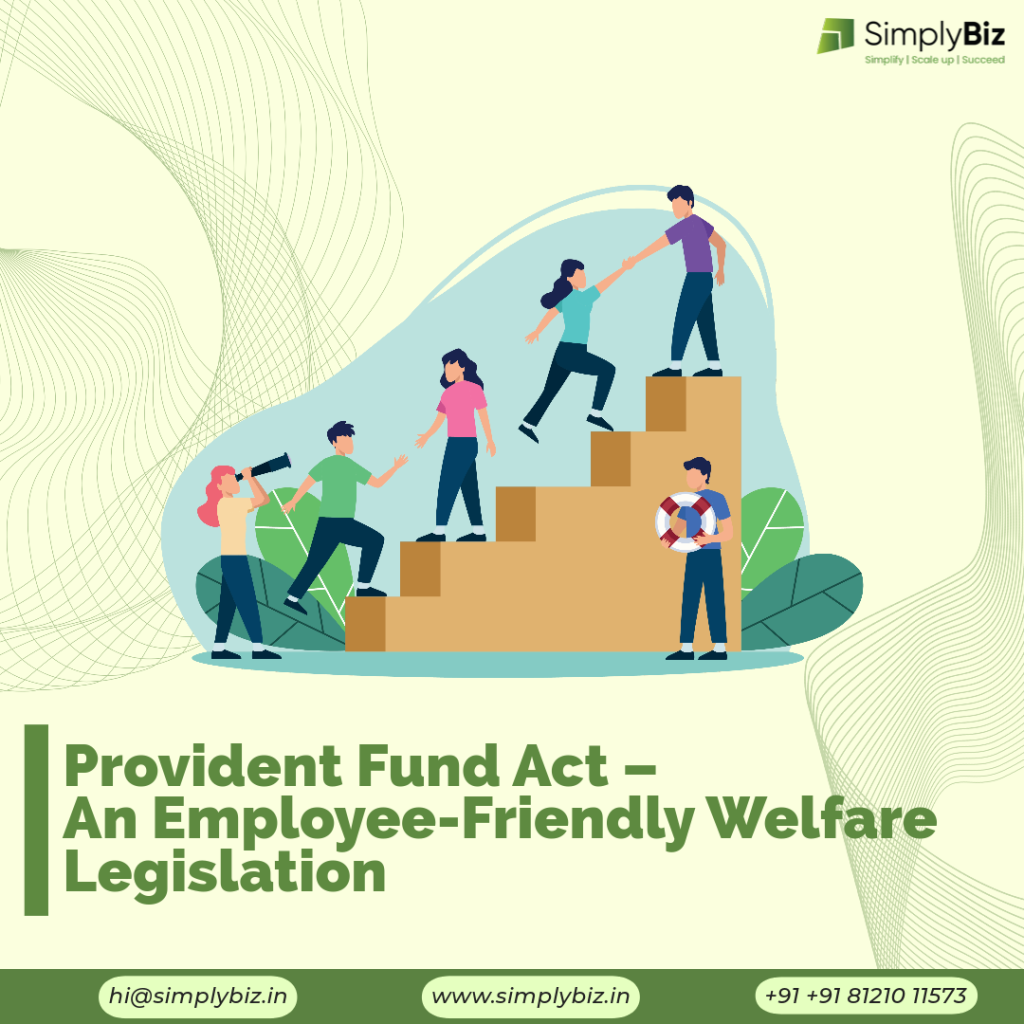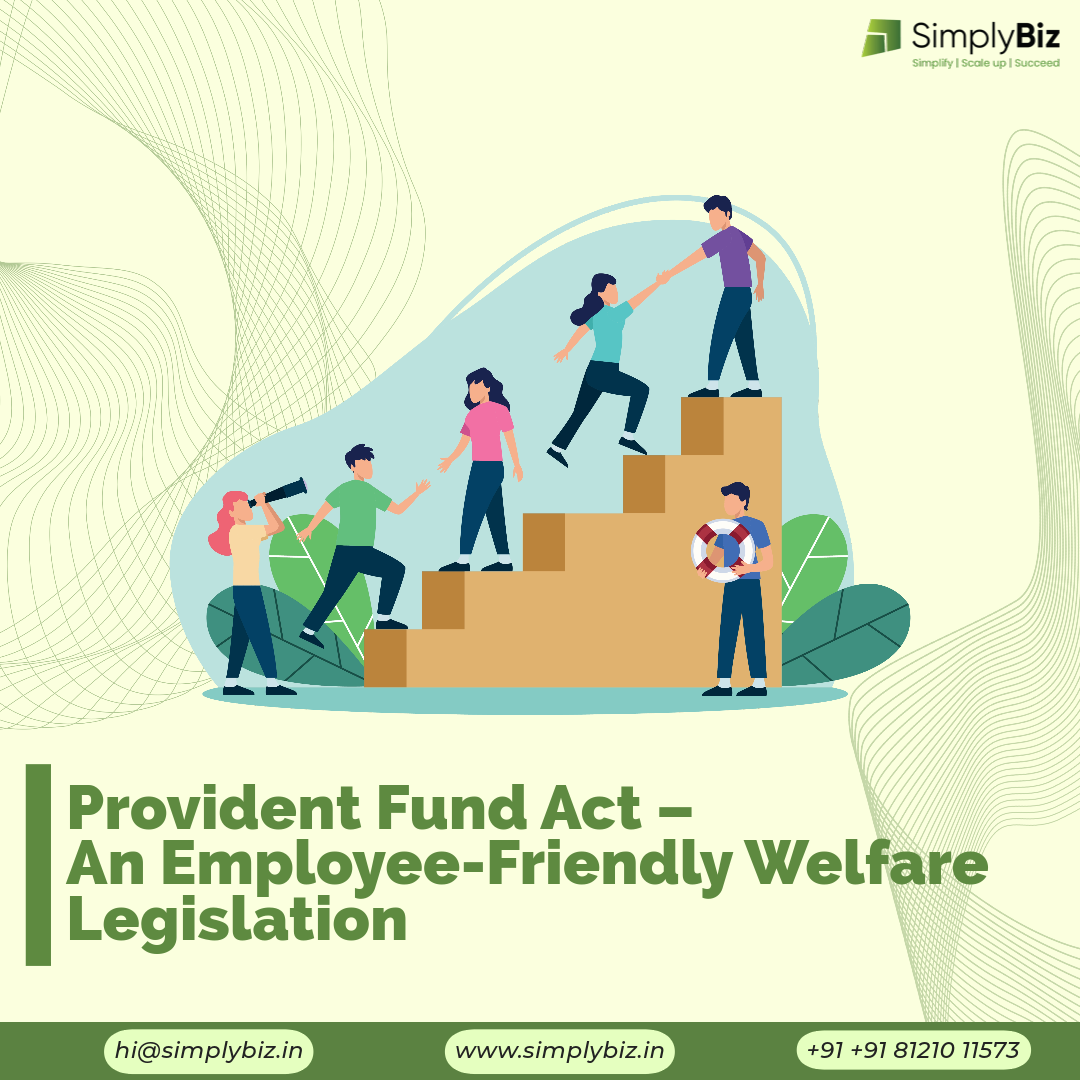Provident Fund Act – an Employee-Friendly Welfare Legislation
Contributed By: S. Prabhakar
Email id: sprabhakar@simplybiz.in
Employees Provident Fund (EFP) is one of the welfare schemes introduced by the Government for the benefit of the employees/workmen. Every company, big or small, need to take compliance with the provisions of EFF Act seriously to avoid stringent prosecution provisions and penalties. In this article, we will explain in detail the provisions relating to Provident Fund
Governing Act: the provisions in respect of employees Provident Fund are governed by the Employees Provident Funds and Miscellaneous Provisions Act, 1952 (the Act) and enacted to provide a kind of social security to industrial workers.

Applicability:
The provisions of the Act are applicable to
- Every factory engaged in any industry specified in Schedule 1 in which 20 or more persons are employed,
- Every other establishment employing 20 or more persons or class of such establishments which the Central Government may notify,
- Any other establishment so notified by Central Government even if employing less than 20 persons,
- Any establishment registered under the Co-operative Societies Act, 1912, or any State Act of Co-operative Societies, employing 50 or more employees and working without the aid of power,
- The Act continues to apply even if the number of employees falls below 20 employees after the Act once becomes applicable,
- If an establishment consists of different departments/branches, whether located in the same place or in different places, all such departments or branches are treated as part of the same establishment for the purpose of the Act.
Who gets covered?
Every employee, including those employed through a contractor, is in receipt of wages/salary up to Rs. 15000 per month, shall be eligible to become a member of EPF. Apprentices engaged under the Apprentices Act are excluded from coverage.
Contribution by employer and employee:
Both employer and employee must contribute an equal amount to the Fund which at present is 12% of the basic pay, dearness allowance and retaining allowance. In addition, Employer has to contribute 0.5% to Employee Deposit Linked Insurance (EDLI) and 0.65% to EPF administration charges and 0.01% to EDLI administration charges. The employer should deduct the contribution of the employee from his salary/wage and along with the matching contribution of the employer should deposit with PF authorities.
In the case of companies, employing less than 20 employees but getting covered by notification by the Government, shall contribute 10% for both employer and employee.
Out of the total amount of contribution by the employer, 67% goes for contribution to Employee Provident Fund and 33% goes towards contribution to Employee’s Pension Scheme.
Salient feature of the Act
- It is applicable throughout the country,
- It is applicable to almost all establishments falling under the class of establishments, wherein 20 persons are employed,
- Benefits are provided to the employees through the schemes framed under the Act,
- Provident Fund benefits are provided under the Employees’ Provident Fund Scheme, 1952,
- Pension benefits are provided under the Employees’ Pension funds scheme, 1952,
- Insurance benefits are provided under the Employees’ Deposit Linked Insurance Scheme, 1976,
- A member of Employees’ Provident fund becomes automatically eligible for pension and Insurance benefits without paying any additional amount of contribution.
Benefits of Provident Fund to the employees
- Provident Fund is a social Security Benefit to employees.
- It is a compulsory saving by an employee during his employment.
- It’s a post-retiral benefit to the employees affording financial security.
- An employee who contributes to the provident fund benefits by a matching contribution from his employer.
Deposit of Contribution
As per PF Rules, every registered employer must mandatorily transfer PF contributions to employees’ accounts by the 15th of each month.
Regulatory returns to be filed
Monthly Returns:
Form 2 – This form contains the details of the nomination and declaration to be filed by the employees and is to be filed along with Form 5.
Form 5 – Form 5 is a monthly report that contains the information of the employees who have been recently enrolled under the PF scheme to be filed by the employer.
Form 10 – is also a monthly report containing details of the PF subscribers who are not part of the scheme in each month to be filed by the employer.
Form 12A – is a monthly report capturing details of the payments made to employees’ individual PF accounts by the employer every month.
Yearly Return:
Besides monthly returns, employers must also file annual PF returns by the 30th of April for the year ending on 31st March.
Form 3A: form 3A contains details about the monthly contributions made by both the employer and the employee towards the employee’s PF account in a given financial year.
Form 6A: Form 6A is a consolidated annual statement containing the contributions made towards every subscriber’s PF account in an organization.
Penal provisions for non-compliance:
Non-compliance of the provisions of the Act, especially non-deposit of the contribution of employees deducted from salary, is viewed seriously and penal provisions are very stringent.
An employer shall be punishable with imprisonment for a term which may extend to three years but
(a) which shall not be less than one year and a fine of Rs. 10000 in case of default in payment of the employees” contribution which has been deducted by the employer from the employees’ wages.
(b) which shall not be less than six months and a fine of five thousand rupees, in any other case:
Where an employer makes default in the payment of any contribution to the Fund the Pension Fund or the Insurance Fund or in the transfer of accumulations required to be transferred by him or in the payment of any charges payable under any other provision of this Act or of any Scheme or Insurance Scheme, the Central Provident Fund Commissioner or such other officer as may be authorised by the Central Government, by notification in the Official Gazette, in this behalf may recover from the employer by way of penalty such damages, not exceeding the amount of arrears, as may be specified in the Scheme. Besides this the Employees PF Organisation (EPFO) can invoke provisions of the Act to recover the dues from the employer. EPFO can lodge a complaint with the police under Section 406/409 of IPC.
Conclusion: Provident Fund is a social security measure for employees aimed at fostering savings at old age at the time of retirement. Implementation of such schemes by the employer will attract good employees towards the organisation. Not only big corporates but small corporates and startups should also adopt Provident Fund voluntarily and do compliances in a sacrosanct manner. There were many instances where promoters of big corporates were arrested for non-compliance with the provision of the Act. It is advisable for small companies to outsource compliance with PF and other welfare legislations to avoid vexing prosecutions.
*S. Prabhakar, is a Fellow member of the Institute of the Company Secretaries of India, Chartered Secretary from the UK, Lawyer, and Registered Insolvency Professional and Social Auditor.
SimplyBiz Private Limited provides managed services in the field of Advisory, Transactions, Business Setup, Compliance, Accounting, and Taxation. SimplyBiz has its Head office in Hyderabad and branch offices in Bengaluru, Chennai, Mumbai, and National Capital Region.


Leave A Comment